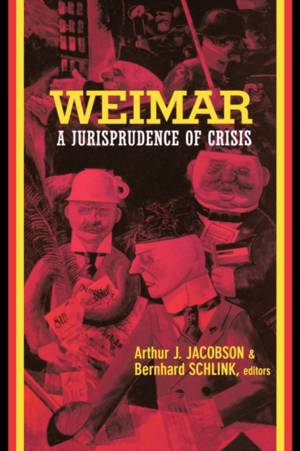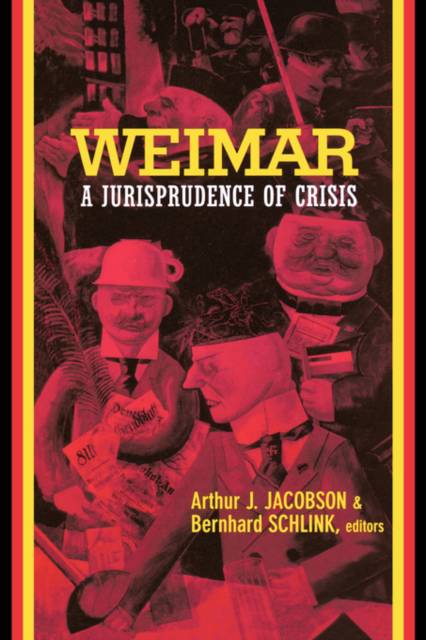
Door een staking bij bpost kan je online bestelling op dit moment iets langer onderweg zijn dan voorzien. Dringend iets nodig? Onze winkels ontvangen jou met open armen!
- Afhalen na 1 uur in een winkel met voorraad
- Gratis thuislevering in België vanaf € 30
- Ruim aanbod met 7 miljoen producten
Door een staking bij bpost kan je online bestelling op dit moment iets langer onderweg zijn dan voorzien. Dringend iets nodig? Onze winkels ontvangen jou met open armen!
- Afhalen na 1 uur in een winkel met voorraad
- Gratis thuislevering in België vanaf € 30
- Ruim aanbod met 7 miljoen producten
Zoeken
Weimar
A Jurisprudence of Crisis
€ 59,45
+ 118 punten
Omschrijving
This selection of the major works of constitutional theory during the Weimar period reflects the reactions of legal scholars to a state in permanent crisis, a society in which all bets were off. Yet the Weimar Republic's brief experiment in constitutionalism laid the groundwork for the postwar Federal Republic, and today its lessons can be of use to states throughout the world. Weimar legal theory is a key to understanding the experience of nations turning from traditional, religious, or command-and-control forms of legitimation to the rule of law.
Only two of these authors, Hans Kelsen and Carl Schmitt, have been published to any extent in English, but they and the others whose writings are translated here played key roles in the political and constitutional struggles of the Weimar Republic. Critical introductions to all the theorists and commentaries on their works have been provided by experts from Austria, Canada, Germany, and the United States. In their general introduction, the editors place the Weimar debate in the context of the history and politics of the Weimar Republic and the struggle for constitutionalism in Germany. This critical scrutiny of the Weimar jurisprudence of crisis offers an invaluable overview of the perils and promise of constitutional development in states that lack an entrenched tradition of constitutionalism.
Only two of these authors, Hans Kelsen and Carl Schmitt, have been published to any extent in English, but they and the others whose writings are translated here played key roles in the political and constitutional struggles of the Weimar Republic. Critical introductions to all the theorists and commentaries on their works have been provided by experts from Austria, Canada, Germany, and the United States. In their general introduction, the editors place the Weimar debate in the context of the history and politics of the Weimar Republic and the struggle for constitutionalism in Germany. This critical scrutiny of the Weimar jurisprudence of crisis offers an invaluable overview of the perils and promise of constitutional development in states that lack an entrenched tradition of constitutionalism.
Specificaties
Betrokkenen
- Uitgeverij:
Inhoud
- Aantal bladzijden:
- 419
- Taal:
- Engels
- Reeks:
- Reeksnummer:
- nr. 8
Eigenschappen
- Productcode (EAN):
- 9780520236813
- Verschijningsdatum:
- 21/10/2002
- Uitvoering:
- Paperback
- Formaat:
- Trade paperback (VS)
- Afmetingen:
- 153 mm x 232 mm
- Gewicht:
- 653 g

Alleen bij Standaard Boekhandel
+ 118 punten op je klantenkaart van Standaard Boekhandel
Beoordelingen
We publiceren alleen reviews die voldoen aan de voorwaarden voor reviews. Bekijk onze voorwaarden voor reviews.










